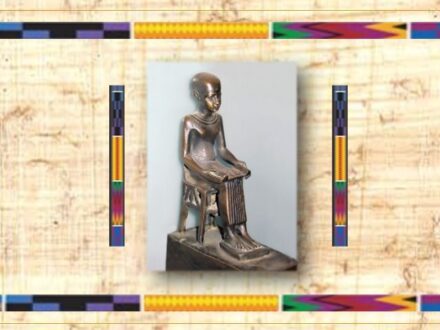
“Waiting For Wakanda, Marooned in America: Movies and Matters of Reflection and Resistance” in Black Panther: Paradigm Shift or Not, Haki Madhubuti and Herb Boyd (eds.), 2019
“The Catastrophe Called Trump: Resisting the Monster Side of America” in Not Our President: New directions from the Pushed Out, the Others and the Clear Majority in Trump’s Stolen America, Haki Madhubuti and Lasana D. Kazembe (eds.), Chicago: Third World Press Foundation, 2017, pp. 151-163.
Nommo, Kawaida and Communicative Practice: Bringing Good Into the World” in Molefi Kete Asante, Yoshitaka Miike and Jing Yin (eds.), The Global Intercultural Communication Reader, 2nd Edition, New York: Routledge, 2014, pp. 211-225
“The Meaning and Measure of Malcolm X: Critical Remembrance and Rightful Reading” in Herb Boyd, Ron Daniels, Maulana Karenga, Haki R. Madhubuti, By Any Means Necessary: Malcolm X, Real Not Reinvented, Chicago, Third World Press, 2012, pp. 10-26
“The Ambivalent Embrace of Barack Obama: The Ethical Significance and Social Apprehension of Blackness”, in Charles P. Henry, Robert L. Allen, and Robert Chrisman (eds.), The Obama Phenomenon: Toward A Multiracial Democracy, Urbana, Chicago, Springfield: University of Illinois Press, 2011, pp. 148-164
“Black Studies and Black Women’s Studies” in Barbara J. Banks (ed.) Gender and Higher Education, Baltimore: The Johns Hopkins University Press, pp. 190-195, 2011
“A Função e Futuro dos Estudos Africana: Reflexões Críticas Sobre sua Missão, seu Significado e sua Metodologia”, Elisa Larkin Nascimento (org.), Afrocentricidade: Uma Abordagem Epistemológica Innovadora, São Paulo: Selo Negro, 2009, pp. 333-359
“Molefi Asante and the Afrocentric Initiative: Mapping the Terrain of His Intellectual Impact,” in Ama Mazama (ed.), Essays in Honor of An Intellectual Warrior, Molefi Kete Asante, Paris: Menaibuc, 2008, pp. 17-49
“The Socio-Political Philosophy of Malcolm X” in James Conyers and Andrew P. Smallwood, (eds.)Malcolm X: An Historical Reader, Durham, NC: Carolina Academic Press, 2008, pp. 93-110
“A Função E Futuro Dos Estudos Africana: Reflexões Críticas Sobre Sua Missão, Seu Significado E Sua Metodologia”, Elisa Larkin Nascimento (org.), Afrocentricidade: Uma Abordagem Epistemológica Inovadora, (Sankofa 4, Matrizes Africana de Cultura Brasileira), São Paulo: Selo Negro, 2009, pp. 333-359.
“The Nguzo Saba and the Black Family: Principles and Practices of Well-Being and Flourishing,” Maulana Karenga and Tiamoyo Karenga, co-authors, in Harriet Pipes McAdoo, (ed.), Black Families, 4th Ed, Thousand Oaks, CA: Sage Publications, 2007, pp-. 7-28.
“The Field, Function and Future of Africana Studies: Critical Reflections on its Mission, Meaning and Methodology,” in Molefi Asante and Maulana Karenga, (eds.), Handbook of Black Studies, Thousand Oaks, CA: Sage Publications, 2006, pp. 402-420.
“Revisiting Brown, Reaffirming Black: Reflections on Race, Law and Struggle,” in Molefi Kete Asante and Maulana Karenga, (eds.), Handbook of Black Studies, Thousand Oaks, CA: Sage Publications, 2006, pp. 165-184.
“Philosophy in the African Tradition of Resistance: Issues of Human Freedom and Human Flourishing,” in Not Only the Master’s Tools: African American Studies in Theory and Practice, (eds.) Lewis R. Gordon and Jane Anna Gordon, Boulder, CO: Paradigm Publishers, 2006, pp. 243-271
“Black Studies,” pp. 257-262, Barbara J. Banks (ed.) Gender and Education: An Encyclopedia, Vol. 1, Westport, CT and London: Praeger, 2008
“African Americans”, vol. 1, pp. 20-30; “Black Power”, vol. 1, pp. 176-179; “Kwanzaa”, Vol. 2, pp. 818-820, in Richard T. Shafer (ed.), Encyclopedia of Race, Ethnicity and Society, Los Angeles: Sage Publications, 2008
“Black Studies”; “Ancient Egyptian Studies Movement”; “Kawaida”; “Kwanzaa”; “Maat”; “Odu Ifa”; “Us”, in Molefi Kete Asante and Ama Mazama, (eds.), Encyclopedia of Black Studies, Newbury Park, CA: Sage Publications, 2005
“Nommo, Kawaida and Communicative Practice: Bringing Good into the World,” in Understanding African American Rhetoric: Classical Origins to Contemporary Innovations, (eds.) Ronald L. Jackson II and Elaine B. Richardson, New York: Routledge, 2003, pp. 3-12
“Sharing the Burden and Possibilities of the Crisis,” in Unveiling the Real Terrorist Mind, (eds.) Nadia Batool Ahmad, et al, New York: Students for International Peace and Justice, pp. 229-235
“Black Studies and the Problematic of Paradigm: The Philosophical Dimension,” in The African American Studies Reader, (ed.) Nathaniel Norment, Durham, NC: Carolina Academic Press, 2001, pp. 282-294
“Black Studies: A Critical Reassessment,”Dispatches from the Ebony Tower: Intellectuals Confront the African American Experience, Manning Marable, (ed.), New York: Columbia University Press, 2000, pp. 162-170.
“Society, Culture and the Problem of Self-Consciousness: A Kawaida Analysis” in Philosophy Born of Struggle: An Anthology of Afro-American Philosophy Since 1917, Leonard Harris (ed.), Kendall/Hunt Publishing Company, 2000.
“Making the Past Meaningful: Kwanzaa and the Concept of Sankofa,” in Spirituality and Social Work Practice: Narratives for Professional Helping, (ed.) Sonia Abels, Denver: Love Publishing Company, 2000, pp. 51-67